In the never-ending drama of the natural world, one peculiar sight often catches our attention: birds relentlessly chasing squirrels. It’s a fascinating display of aerial pursuit, leaving us wondering what drives these avian creatures to engage in such behavior.
Is it a mere game of cat and mouse, or is there a deeper reason behind this rivalry? Understanding why do birds chase squirrels can shed light on the intricate dynamics of animal behavior and territoriality.
From competition for resources to protecting their nests, birds have their own reasons for engaging in these high-flying pursuits.
Join us as we delve into the fascinating world of bird-squirrel interactions, exploring the possible explanations behind this captivating phenomenon.
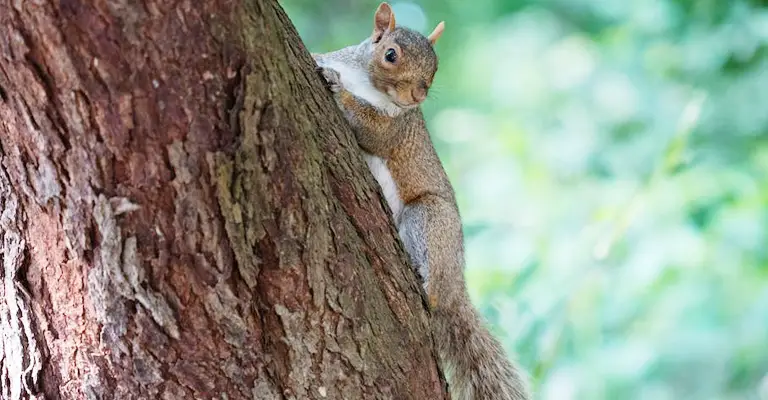
Why Do Birds Chase Squirrels?
The reasons behind birds chasing squirrels are diverse and interconnected. Below are some key factors:
Defense of Territory
- Resource Competition: Birds may chase squirrels to protect their territory and resources, such as food sources or nesting sites. By driving away squirrels, birds ensure they have exclusive access to these valuable assets.
- Nest Protection: Birds are fiercely protective of their nests and offspring. Chasing squirrels away helps prevent potential threats to their young, ensuring their survival.
Food Competition
Seed and Nut Disputes: Squirrels are notorious for raiding bird feeders and stealing seeds or nuts intended for birds. Chasing squirrels away allows birds to safeguard their food sources and ensure they have enough sustenance for themselves and their young.
Predator Alert
- Alarm Calls: Birds have a keen sense of detecting potential predators. When they spot a squirrel, they may emit alarm calls to alert other birds in the area, creating a unified defense against shared threats.
- Distraction Tactics: By chasing squirrels, birds divert the attention of potential predators away from their nests or vulnerable offspring, increasing their chances of survival.
Nest Site Selection
Squirrel Disruption: Squirrels are known to take over bird nests or use them as a base for their own activities. Birds may chase squirrels to discourage them from occupying or damaging their chosen nest sites, ensuring the availability of suitable nesting locations.
Territorial Display
Dominance Assertion: Chasing squirrels can be a display of dominance by birds, establishing their authority and defending their territory against intruders. This behavior helps maintain social hierarchies within bird communities.
Instinctual Response
Prey Drive: Birds, especially predatory species, have an innate instinct to chase and capture small, fast-moving creatures. Chasing squirrels may be a manifestation of this natural prey drive, even if squirrels are not their primary food source.
Playful Behavior
Exercise and Stimulation: Birds, like many animals, engage in playful behavior for exercise and mental stimulation. Chasing squirrels can be a form of entertainment and a way for birds to expend energy.
Interspecies Aggression
Species Rivalry: Some bird species may have a natural rivalry or aggression towards squirrels. This could be due to competition for resources, differences in nesting habits, or simply an inherent dislike for each other’s presence.
Territory Expansion
Expanding Boundaries: Birds may chase squirrels to expand their territory or establish new nesting sites. By driving squirrels away, birds can claim new areas and increase their chances of finding suitable habitats.
Mating Displays
Courtship Behavior: In some bird species, males may engage in elaborate courtship displays to attract females. Chasing squirrels could be a part of this display, showcasing the male’s agility, strength, and ability to protect potential mates and offspring.
Social Learning
Observational Learning: Birds are known to learn from each other through observation. If one bird witnesses another chasing squirrel, it may imitate the behavior, leading to a chain reaction of chasing squirrels within a bird community.
Mistaken Identity
Similar Visual Cues: Birds may mistake squirrels for potential threats or predators due to their quick movements or similar appearance to actual predators. Chasing squirrels could be a defensive response based on this misidentification.
Habituation
Learned Behavior: In some cases, birds may have learned over time that chasing squirrels can be an effective way to deter them from their territory or resources. This learned behavior can be passed down through generations, becoming a common practice among certain bird populations.
Do All Birds Chase Squirrels?
While not all bird species chase squirrels, there are indeed some bird species known to engage in this behavior. Here are a few examples:
Blue Jays (Cyanocitta cristata)
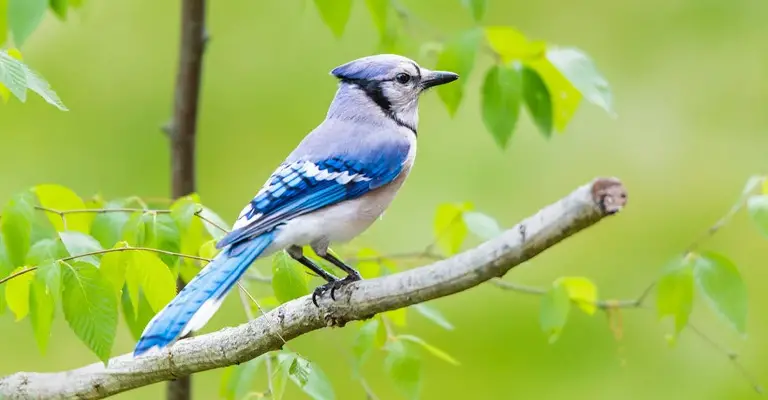
Blue Jays are known for their bold and assertive nature. They often chase squirrels away from their territory, especially when it comes to protecting their nests and food sources.
American Robins (Turdus migratorius)
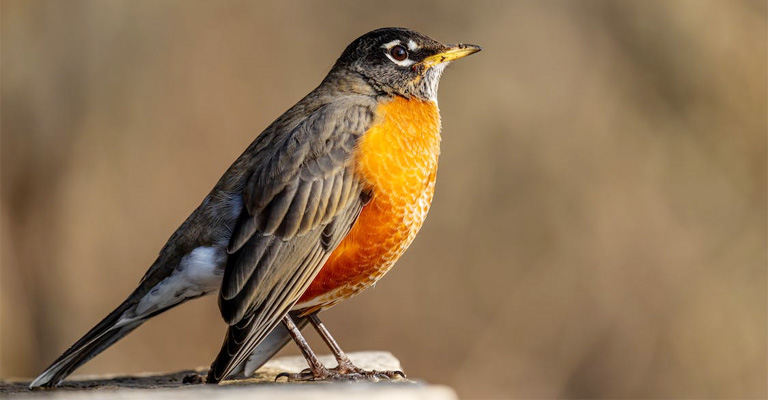
American Robins are territorial birds that may chase squirrels to defend their nesting sites and foraging areas. They are particularly protective during the breeding season.
Northern Mockingbirds (Mimus Polyglottos)
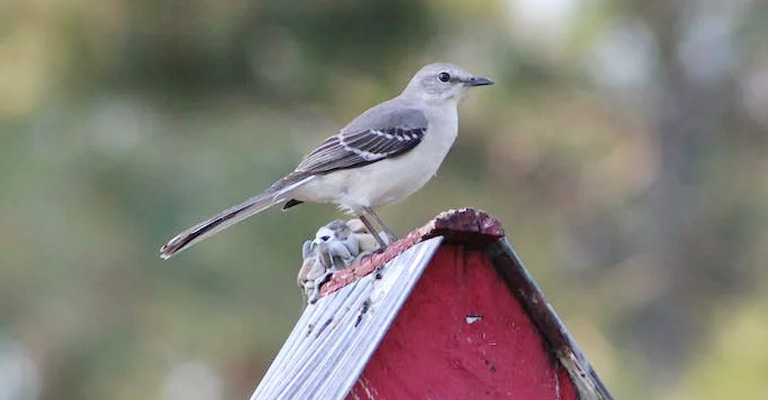
Mockingbirds are highly territorial and known for their aggressive behavior towards intruders. They may chase squirrels away to protect their nests and food sources.
Red-winged Blackbirds (Agelaius phoeniceus)
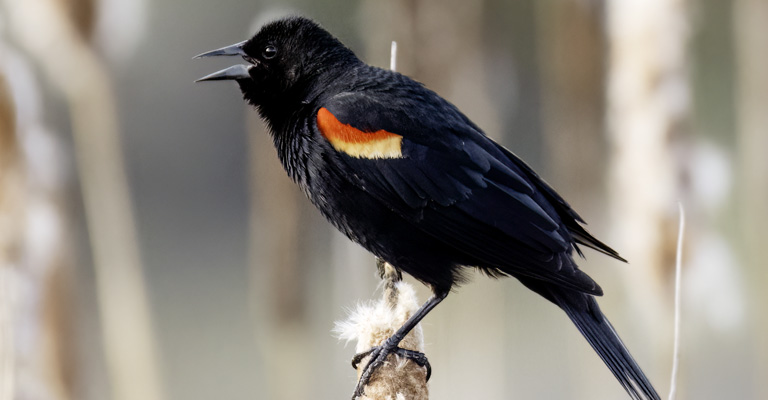
Male Red-winged Blackbirds are known to be territorial and may chase squirrels to defend their nesting territories and attract mates during the breeding season.
Eastern Towhees (Pipilo erythrophthalmus)
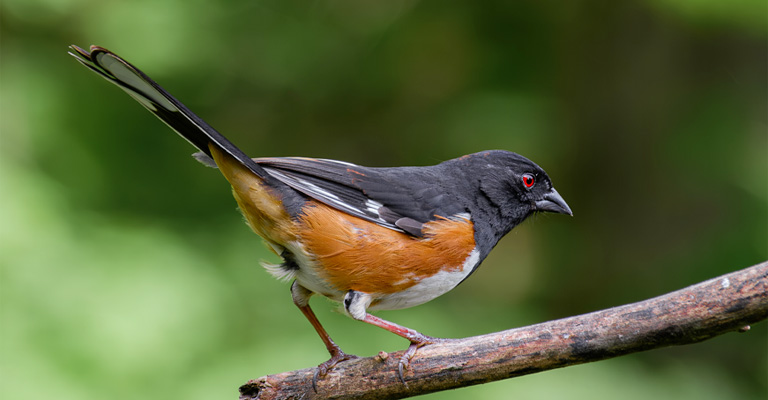
Towhees are ground-dwelling birds that may chase squirrels away from their preferred foraging areas. They are known for their distinctive “chewink” call.
It’s important to remember that bird behavior can vary within species and individuals. While these bird species are commonly observed chasing squirrels, it doesn’t mean that all individuals of these species will engage in this behavior.
Additionally, there may be other bird species not mentioned here that also chase squirrels based on their specific ecological context and interactions with squirrels in their habitats.
Are Squirrels Harmed by Bird Attacks?
In general, squirrels are not typically harmed by bird attacks. While birds may chase squirrels as a territorial or defensive behavior, their intent is usually to drive the squirrels away rather than cause physical harm.
The purpose of these chases is often to protect resources, such as food sources or nesting sites, or to defend their territory and offspring.
Birds are generally smaller and less physically powerful than squirrels, so they rely on intimidation and pursuit rather than direct confrontation.
The chase itself serves as a deterrent, signaling to the squirrel that it is not welcome in the bird’s territory.
Squirrels are agile and quick, and they can usually escape from birds by climbing trees or finding shelter in their nests or dens.
However, it’s worth noting that in rare cases, particularly if a bird is particularly aggressive or if the squirrel is injured or cornered, there may be instances where physical contact occurs. In such cases, there is a possibility of minor injuries, such as scratches or bites.
But overall, bird attacks on squirrels are not typically a significant threat to the squirrels’ well-being. It’s important to remember that interactions between birds and squirrels are a natural part of their ecological dynamics.
These interactions contribute to the complex web of relationships in the natural world, shaping the behavior and adaptations of both species.
How Do Squirrels Defend Against Bird Attacks?
Squirrels have several defense mechanisms to protect themselves against bird attacks. While birds may chase squirrels, the squirrels have evolved strategies to evade and deter their avian adversaries.
Here are some ways squirrels defend themselves:
Agility and Speed
Squirrels are incredibly agile and nimble climbers. When pursued by birds, they can quickly ascend trees, leaping from branch to branch, making it difficult for birds to follow. Their ability to navigate complex arboreal environments gives them an advantage in escaping bird attacks.
Evasive Maneuvers
Squirrels employ evasive tactics to confuse and outmaneuver birds. They may change direction abruptly, zigzag, or make sudden stops and starts, making it challenging for birds to predict their movements and maintain pursuit.
Vocalizations
Squirrels emit vocalizations, such as alarm calls or distress signals, when they sense danger. These vocalizations can alert other squirrels in the area, as well as potentially attract the attention of other animals that may intervene or scare off the pursuing birds.
Hiding in Nests or Dens
Squirrels have nests, called dreys, or dens where they can seek refuge from bird attacks. These structures provide shelter and protection, making it difficult for birds to reach them.
Squirrels may retreat to their nests or dens when they sense danger, waiting until the threat has passed.
Intimidation Displays
In some cases, squirrels may engage in intimidation displays to deter birds. They may puff up their fur, flick their tails, or make aggressive postures appear larger and more threatening. These displays can discourage birds from pursuing further.
Group Defense
Squirrels may engage in cooperative defense when faced with bird attacks. Multiple squirrels may band together, vocalize, and exhibit coordinated behavior to intimidate or overwhelm the birds, increasing their chances of repelling the attackers.
FAQs
While squirrels primarily rely on evasion and defensive tactics to escape bird attacks, there are instances where they may fight back if cornered or threatened. Squirrels have sharp teeth and claws that they can use to defend themselves if necessary.
In general, squirrels are not known to cause significant harm to birds during encounters. While there may be occasional minor injuries, such as scratches or bites, the size and agility of squirrels are usually not enough to cause serious harm to birds.
While most bird species may engage in chasing behavior toward squirrels, some species are known to be more aggressive than others.
Blue Jays, for example, are often observed aggressively chasing squirrels to protect their territory and resources.
Squirrels are intelligent and adaptable creatures. If they consistently encounter aggressive birds in certain areas, they may learn to avoid those locations to minimize the risk of bird attacks.
While birds may chase squirrels, there are other predators that pose a greater threat to squirrels’ safety.
These include ground-dwelling predators like foxes, raccoons, and domestic cats. These predators have the ability to climb trees or access squirrel nests, making them more formidable threats compared to birds.
Bottom Line
As we conclude our exploration into the world of bird-squirrel interactions, we have discovered that the reasons behind birds chasing squirrels are multifaceted.
From defending their territory and resources to protecting their nests and young, birds exhibit a range of behaviors when it comes to these furry intruders.
The intricate dynamics between these two species highlight the complexities of the natural world and the strategies animals employ to ensure their survival.
So, the next time you witness a bird in hot pursuit of a squirrel, remember that there’s more to it than meets the eye.
Nature’s dramas unfold in unexpected ways, and the battle for territory between birds and squirrels is just one captivating chapter in the ongoing story of the animal kingdom.